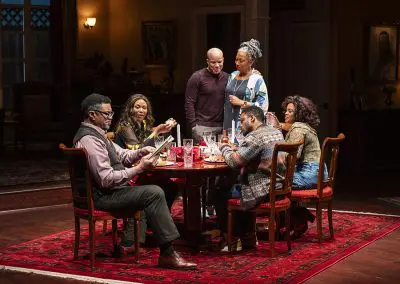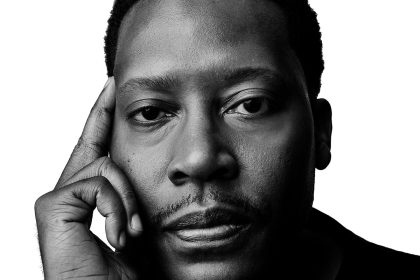
Far From Heaven harks back to an era of American traditionalism, where in the 1950s conservatism was at its peak and somewhat simple things like having a Black friend, or even a job if you were a woman, were considered taboo. The musical by Richard Greenberg (book), Michael Korie (lyrics), and Scott Frankel (music) is based on the 2002 movie featuring Julianne Moore, which tells the story of well-to-do housewife Cathy Whitaker, who lives with her husband Frank and their two children in a wealthy suburb of Hartford, Connecticut, in 1957. Whitaker (played by formidable actress Summer Naomi Smart) appears to have it all — money, a beautiful family, and a great love life, but slowly her world begins to unravel.
Consistent with the time, Whitaker is a homemaker with no job, and as the audience comes to learn, no money or savings of her own either. Most of her time is spent taking care of her children and hanging out with her crew of lonely housewife friends. You get a sense of how boring life must have been, as Cathy is actually the “it girl” in the group, and the subject of a feature newspaper spread on her daily life. More so than adoration from her friends, what Cathy really wants is time with her husband Frank, who’s consistently unavailable due to late hours working in the office. On a late-night surprise trip to office she finds Frank (played by Brandon Springman) at “work” on top of his male co-worker.
Director Rob Lindsey, who himself recalls “coming out of divorce and the closet,” demonstrates that homosexuality in the 1950s was viewed as more of a disease than a decision. To this end, Cathy implores Frank to seek out behavior therapy to “cure” him of his desire for other men. In good taste, Cathy doesn’t share her troubles with her gossipy housewife friends, but finds a confidant in her gardener Raymond Deagan (played by Evan Tyrone Martin), a cultured Black man with a sympathetic and almost apologetic demeanor. Race is as strong a theme in Far From Heaven as homosexuality, and as Cathy’s relationship with Raymond develops, you get a feeling that 20 minutes could have been chopped off of the first act to explore the intricacies of their relationship further.

Equally intriguing as the exploration of social taboos, was the artistic aesthetic weaved into the story’s backdrop. While the set design was rather basic, costume designer Bill Morey slayed 1950s high-end fashion. Summer Smart evoked thoughts of Gene Tierney wearing the likes of Oleg Cassini in a scene from “Leave Her to Heaven.” Then there was Brandon Springman and Brian Zane in well-tailored suits with an early introduction to the skinny tie. True art buffs will even appreciate references to Pablo Picasso, Joan Miro, and Marc Chagall discussed, interestingly, as contemporary artists.
Still, for a musical to shine, it must have, well — great music. Here, Summer shows she’s more than just a pretty face as her strongest vocal performances shine through at moments when Cathy Whitaker is experiencing immense pain. While the entire cast delivered in the way of strong vocal performances, this reviewer was left longing for more moments of pure dialogue.
If not for the fashion alone, Far From Heaven is certainly worthy of the price of admission, but it misses that special something that tugs at the heart strings. Even so, this musical reminds us both of how far we’ve come in the areas of both gay and civil rights, and yet, how much further we still have to go.
Porchlight Music Theatre’s Far From Heaven is showing through March 13 at Stage 773 (1225 W. Belmont) in Chicago. Run time is 2:20 with one intermission.










